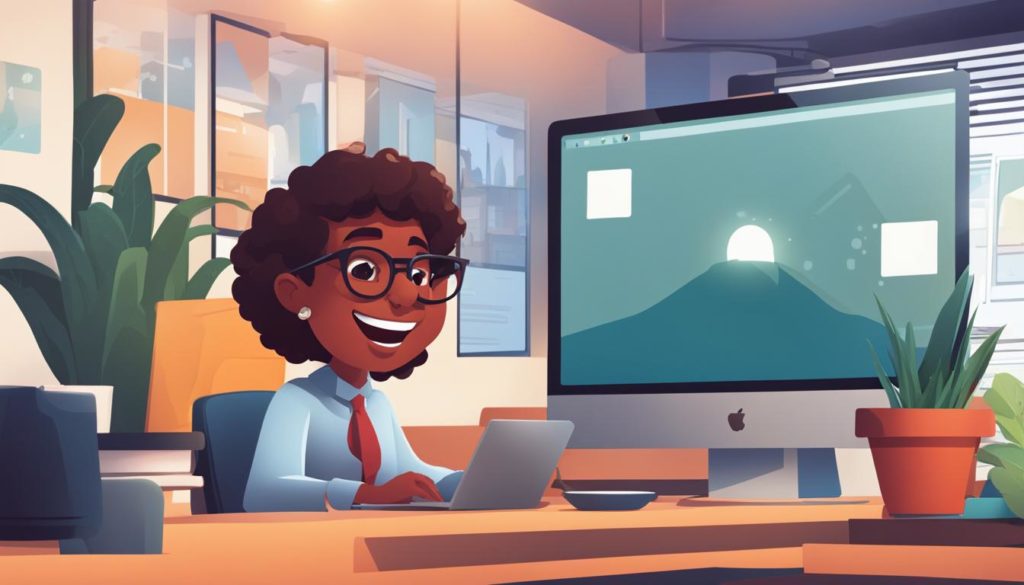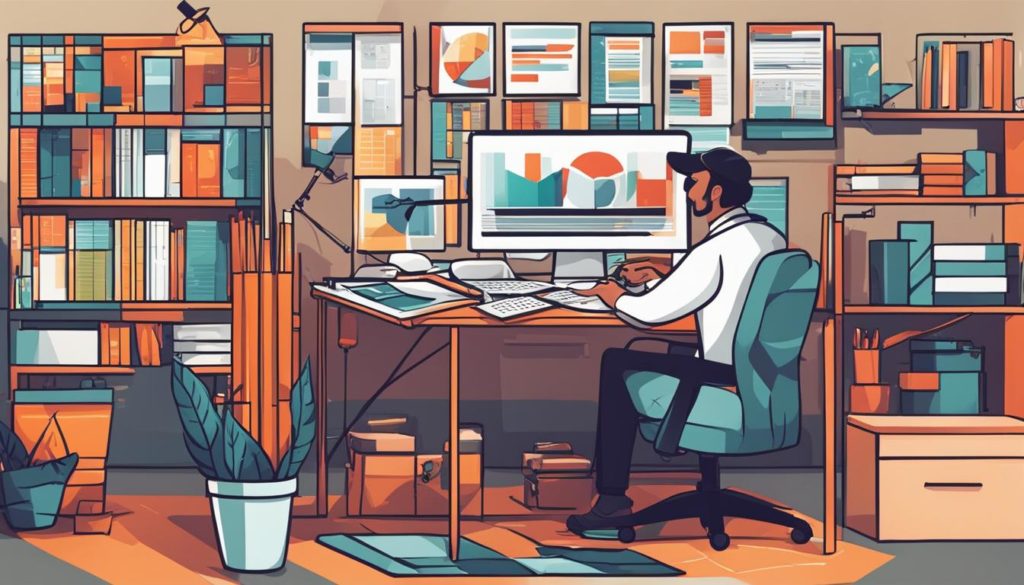Finding the right web designer for your small business is essential for creating a successful online presence. Follow this ultimate guide to learn how to choose a web designer who aligns with your vision and can meet your business goals. By considering factors such as their previous work, industry experience, client testimonials, and communication style, you can make an informed decision when hiring a web designer.
Key Takeaways:
- Choosing the right web designer is crucial for your small business website’s success
- Evaluate their previous work, industry experience, and client testimonials
- Communication style and compatibility with your vision are important factors to consider
- Consider whether you prefer working with a web design agency or an individual designer
- Assess the web designer’s preferred platform and its compatibility with your website needs
Step One: Check out the web designer’s previous work
When searching for a web designer for your small business, one of the first steps is to carefully review their portfolio. A web designer’s previous work serves as a window into their design aesthetic and capabilities. By examining their portfolio, you can assess whether their style aligns with your brand and if they have experience creating websites that resonate with your target audience.
It’s also important to go beyond static screenshots and explore live websites that the designer has created. This allows you to experience the functionality and user experience firsthand. Look for websites that have a professional finish, with clean and intuitive navigation. Consider whether the designer has taken a strategic approach to their designs, ensuring that aesthetics are complemented by thoughtful layout and user interface to drive engagement and conversions.
Table: Comparing Web Designer Portfolios
| Designer | Web Design Portfolio Highlights |
|---|---|
| Designer A | 1. Clean and modern designs 2. Mobile-friendly layouts 3. E-commerce website experience |
| Designer B | 1. Creative and artistic designs 2. Interactive and engaging elements 3. Strong visual storytelling |
| Designer C | 1. Corporate and professional designs 2. Emphasis on user experience 3. Integration with CRM systems |
Remember that the web designer’s portfolio is a demonstration of their capabilities, so it’s crucial to carefully evaluate their work to ensure it aligns with your vision and goals for your small business website.
Step Two: Consider their industry experience
When choosing a web designer for your small business, it’s important to consider their industry experience. Look for a designer who has worked with businesses similar to yours, as they will have a better understanding of your sector and the specific objectives and functionality you may require for your website.
By selecting a web designer with industry experience, you can benefit from their knowledge of best practices, industry trends, and user expectations. They can offer valuable insights on how to create a website that effectively communicates your brand message and caters to your target audience.
Additionally, consider if the web designer has experience working with businesses at the same stage of development as yours. This can be particularly beneficial as they may better understand the challenges and needs of businesses in that phase. They will have a clearer understanding of the goals and priorities for a small business website, helping you achieve a more successful outcome.
Table: Comparison of web designer candidates’ industry experience
| Web Designer | Industry Experience | Client Testimonials |
|---|---|---|
| Designer A | Extensive experience in the retail sector | Positive feedback from retail clients |
| Designer B | Specializes in the hospitality industry | Favorable testimonials from hotels and restaurants |
| Designer C | Works primarily with tech startups | Highly recommended by tech industry clients |
By evaluating the industry experience of potential web designers and considering their alignment with your specific sector, website objectives, and desired functionality, you can make an informed decision and choose a web designer who is best suited to meet your small business’s needs.
Step Three: Speak to past clients or check testimonials
One of the most effective ways to gauge the quality of a web designer’s work and their overall client experience is by speaking to their past clients or checking for testimonials. Hearing directly from those who have worked with the designer can provide valuable insights into their communication skills, professionalism, and the results they were able to achieve.
Reaching out to past clients allows you to ask specific questions about their experience working with the web designer. You can inquire about the designer’s responsiveness, ability to meet deadlines, and overall satisfaction with the final website. By gathering feedback from multiple clients, you can develop a comprehensive understanding of the designer’s strengths and weaknesses.
If it’s not possible to speak directly with past clients, you can also look for testimonials or reviews on third-party platforms. These testimonials can provide a snapshot of the designer’s reputation and the level of satisfaction among their previous clients. Look for testimonials that highlight the designer’s ability to understand and meet the client’s objectives, their professionalism in managing the project, and their overall communication skills.

| Testimonial | Client Name | Website |
|---|---|---|
| “Working with [Web Designer] was a seamless experience. They were responsive, attentive to detail, and understood our vision completely. Our website has exceeded our expectations and we couldn’t be happier!” | John Smith | www.examplewebsite.com |
| “I highly recommend [Web Designer]. They were able to capture the essence of our brand and translate it into a user-friendly website. Throughout the process, they were professional, responsive, and delivered exceptional results.” | Jane Doe | www.anotherexample.com |
By taking the time to speak with past clients or review testimonials, you can gain valuable insights into the web designer’s track record and client satisfaction. This information will help you make an informed decision and find a web designer who is the right fit for your small business.
Step Four: Schedule a discovery call and ask questions
After reviewing the web designer’s previous work, considering their industry experience, and checking testimonials, it’s time to take the next step in finding the right web designer for your small business. Schedule a discovery call with potential web designers to discuss your project and ask them important questions. This call will help you evaluate their communication style, assess whether you feel comfortable working with them, and determine if they understand your goals and priorities.
During the discovery call, ask the web designer about their experience working on similar projects and their approach to design and development. Inquire about their understanding of your industry and how they can tailor their services to meet your specific needs. Discuss timelines and project management to ensure they can deliver within your desired timeframe. Take note of the questions they ask you as well, as this can indicate their level of interest and their ability to provide valuable input.
Building a rapport with the web designer is crucial for a successful collaboration. Use this conversation as an opportunity to gauge their personality and professionalism. Consider their responsiveness and willingness to listen to your ideas and requirements. Trust your instincts and choose a web designer with whom you feel confident and comfortable working.
Remember, the discovery call is not only for the web designer to assess if they want to work with you, but also for you to assess if they are the right fit for your small business. By asking the important questions and relying on your intuition, you can make a well-informed decision when selecting a web designer to bring your online vision to life.
“The discovery call is a crucial step in the web designer selection process. It allows you to get a sense of the designer’s communication style, expertise, and how well they understand your business goals. Make sure to ask questions that are important to you and pay attention to how they respond. This will help you determine if you can establish a productive and collaborative relationship with them.”
Now that you know how to schedule a discovery call and ask the right questions, let’s move on to the next step in finding the perfect web designer for your small business.

Table: Questions to Ask During a Discovery Call
| Question | Purpose |
|---|---|
| Can you provide examples of websites you have designed in a similar industry? | Evaluating their experience and expertise in your industry |
| What is your approach to design and development? | Understanding their methodology and creative process |
| How do you handle project timelines and communication? | Ensuring they can meet your desired timeframe and have efficient project management |
| What is your understanding of our business goals and target audience? | Assessing their ability to align with your objectives and connect with your customers |
| Can you provide references from past clients? | Gaining insights into their client relationships and overall satisfaction |
Step Five: Assess the web designer’s professionalism and organization
When choosing a web designer for your small business, it is crucial to assess their professionalism and organization. This step involves evaluating their responsiveness, contract and payment process, and overall approach to their work. By considering these factors, you can ensure that you hire a web designer who will provide a smooth and professional experience.
First and foremost, responsiveness is key. A professional web designer should promptly reply to your emails and inquiries, demonstrating their commitment to timely communication. Lack of responsiveness can lead to delays and frustrations during the project, so it’s essential to choose someone who values clear and effective communication.
In addition to responsiveness, you should also review the web designer’s contract and payment process. A professional designer will have a well-defined contract that outlines the scope of work, timelines, and payment terms. Take the time to read through the contract carefully and ensure that it protects both parties’ interests.
Lastly, the overall professionalism in approach should be evaluated. A professional web designer will demonstrate excellent project management skills, keeping you informed about the progress and providing regular updates. They should also have a structured workflow and clearly communicate their expectations and requirements from you as the client. Pay attention to their attention to detail, organization, and ability to meet deadlines.

| Key Factors | Assessment |
|---|---|
| Responsiveness | Regular and timely communication |
| Contract and Payment | Clear, comprehensive contract and transparent payment process |
| Professionalism in approach | Effective project management, attention to detail, and meeting deadlines |
By carefully evaluating the web designer’s professionalism and organization, you can ensure a smooth and successful collaboration. Remember, a professional web designer will not only create a visually appealing website but also provide a professional and enjoyable experience throughout the design process.
Decide between an Agency or a One-person Show
When choosing a web designer for your small business, you may be faced with the decision of whether to hire a web design agency or an individual designer. Both options have their pros and cons, and it’s important to consider your specific needs and preferences.
Web Design Agency: An agency typically consists of a team of professionals who specialize in different aspects of web design. They often have more resources and expertise to handle complex projects. Agencies can offer a range of services, including web development, graphic design, and digital marketing. However, working with an agency may involve more layers of communication and coordination, potentially leading to longer project timelines and higher costs.
Individual Web Designer: Hiring an individual web designer can provide a more personalized experience. They can offer a closer working relationship and may have a faster turnaround time for smaller projects. Individual designers often have a specific niche or area of expertise, which can be advantageous if it aligns with your industry or business needs. However, they may have limitations in terms of resources and availability, especially if they are juggling multiple clients.
Table: Pros and Cons of Agency vs. Individual Designer
| Web Design Agency | Individual Designer |
|---|---|
| Pros | Pros |
| Access to a team of specialists | Personalized experience |
| More resources and expertise | Faster turnaround for smaller projects |
| Range of services offered | Niche expertise |
| Cons | Cons |
| Longer project timelines and higher costs | Limited resources and availability |
| More layers of communication and coordination | Potential lack of diverse skill set |
Ultimately, the decision comes down to your specific needs, budget, and preferences. Consider the scope and complexity of your project, as well as the level of personalization and expertise you require. Research and interview both agencies and individual designers to assess their portfolios, references, and track records. By making an informed decision, you can find the right web designer who will effectively meet your small business’s website design needs.
Assess the web designer’s preferred platform
When choosing a web designer for your small business, it’s important to consider their preferred platform for website development. Different platforms offer unique features and capabilities, so finding a designer who can work with the platform that best suits your needs is crucial.
Some popular web design platforms include Squarespace, WordPress, Wix, Shopify, and Showit. Each platform has its own strengths and weaknesses, and it’s essential to evaluate their compatibility with your website requirements.
For example, Squarespace is known for its user-friendly interface and attractive templates, making it a great choice for small businesses with limited technical expertise. WordPress, on the other hand, offers unparalleled flexibility and customization options, making it ideal for businesses that require advanced functionality.
Additionally, platforms like Wix and Shopify cater to specific types of businesses. Wix is a versatile platform that is suitable for a wide range of industries, while Shopify specializes in e-commerce websites.
| Platform | Strengths | Weaknesses |
|---|---|---|
| Squarespace | User-friendly interface, attractive templates | Less flexibility and customization compared to other platforms |
| WordPress | Unparalleled flexibility, extensive plugin library | Requires more technical expertise |
| Wix | Versatile platform, drag-and-drop editor | May not be suitable for complex websites |
| Shopify | Specializes in e-commerce, built-in online store features | Less suitable for non-commerce websites |
| Showit | Drag-and-drop website builder with design freedom | Less suitable for large-scale websites with complex functionality |
By understanding the strengths and weaknesses of each platform and considering your specific website needs, you can choose a web designer who has experience and expertise in working with the platform that aligns best with your requirements. This will ensure a seamless collaboration and the creation of a website that meets your business goals.
Is matching the designer’s preferred platform mandatory?
While it’s beneficial to hire a web designer who is familiar with your preferred platform, it’s not always mandatory. Experienced web designers are often adaptable and can work with various platforms. If you have a specific platform in mind, you can look for designers who have previous experience working with that platform. However, don’t limit your options solely based on platform compatibility. A skilled designer can quickly learn and adapt to your preferred platform if they don’t have prior experience with it.
Ultimately, the most important aspect is finding a web designer who understands your vision, has a portfolio that resonates with your brand, and can deliver a website that meets your goals, regardless of the platform they prefer. Open communication and collaboration are key in ensuring that the final website reflects your business objectives and engages your target audience.
Conclusion
Hiring a web designer for your small business is a crucial decision that can greatly impact your online presence. By following the steps outlined in this guide, you can find a web designer who aligns with your vision, has the necessary expertise and experience, communicates effectively, and can deliver a website that meets your goals.
It is important to thoroughly evaluate a web designer’s previous work to ensure their design aesthetic aligns with your brand and consider their industry experience to find someone with a better understanding of your sector. Speaking to past clients or checking testimonials can provide valuable insights into a designer’s communication, professionalism, and the results they have achieved. Scheduling a discovery call allows you to gauge their understanding of your goals and assess their compatibility with your working style.
Additionally, it’s essential to assess a web designer’s professionalism, organization, and responsiveness to ensure a smooth working relationship. Considering the pros and cons of working with a web design agency versus an individual designer will help you determine the best fit for your needs. Lastly, make sure to evaluate a web designer’s preferred platform to ensure compatibility with your specific website needs.
With the right web designer, you can create a professional and impactful website for your small business, enhancing your online presence and helping you achieve your business goals.
FAQ
What should I look for in a web designer’s portfolio?
When reviewing a web designer’s portfolio, consider whether their design aesthetic aligns with your brand and if the websites they have created are professional and functional.
Is it important to choose a web designer who has experience working in my industry?
Yes, selecting a web designer with industry experience can be beneficial as they will have a better understanding of your sector and the specific objectives and functionality you may require for your website.
How can I get insights into a web designer’s work and client experience?
Reach out to their past clients and ask about their experience working with the designer. You can also check for testimonials or reviews on third-party platforms to gauge their reputation.
What should I ask during a discovery call with a web designer?
Use the discovery call to discuss your project and ask important questions. Evaluate their communication style, understanding of your goals, and the questions they ask you to gauge their interest and ability to challenge you in a productive way.
How can I assess a web designer’s professionalism and organization?
Consider their responsiveness to your emails and inquiries. Look for clear processes, such as a sound contract and payment system. Ensure they have clear communication and project management skills.
Should I choose a web design agency or an individual designer?
It depends on your preferences and needs. Agencies offer a range of specialists and more resources, but internal communication and delays can be a challenge. Individual designers may provide a personalized experience but may have limitations in expertise and availability.
What should I consider when it comes to the web designer’s preferred platform?
Find out what platform the web designer prefers to work with and ensure it aligns with your website needs. Consider platforms like Squarespace, WordPress, Wix, Shopify, or Showit, and choose a designer who can work with the platform that best suits your requirements.
Why is hiring a web designer for my small business important?
Hiring the right web designer can greatly impact your online presence. By finding a web designer who aligns with your vision, has relevant expertise, and communicates effectively, you can create a professional and impactful website for your small business.

